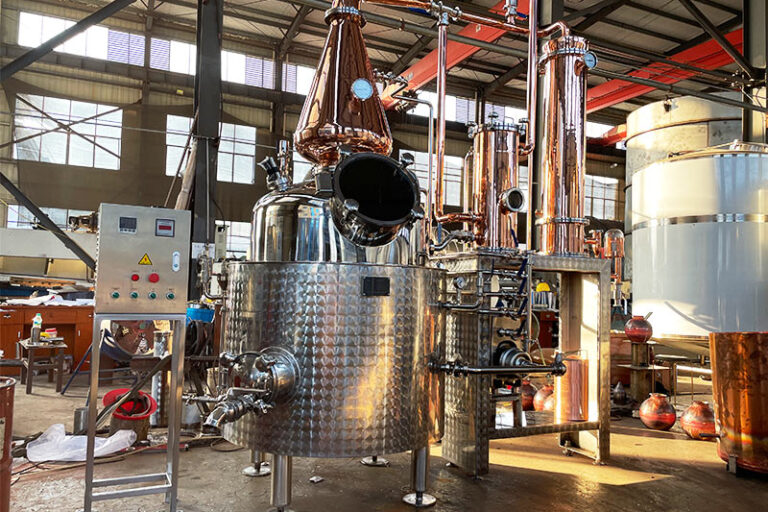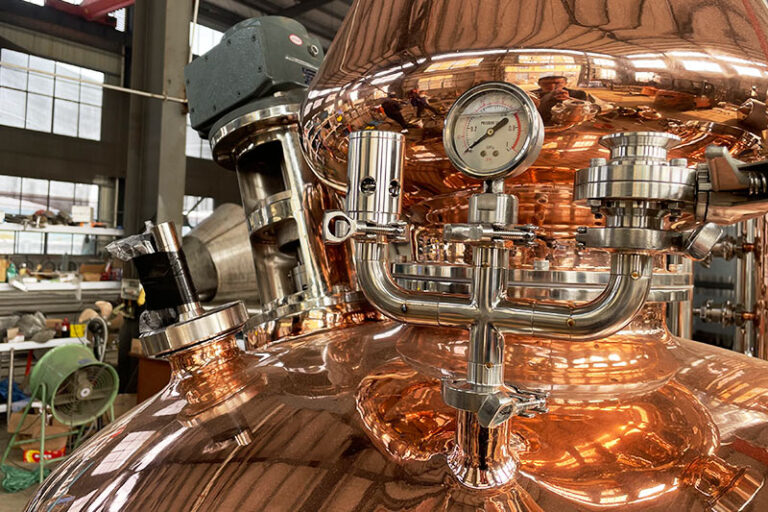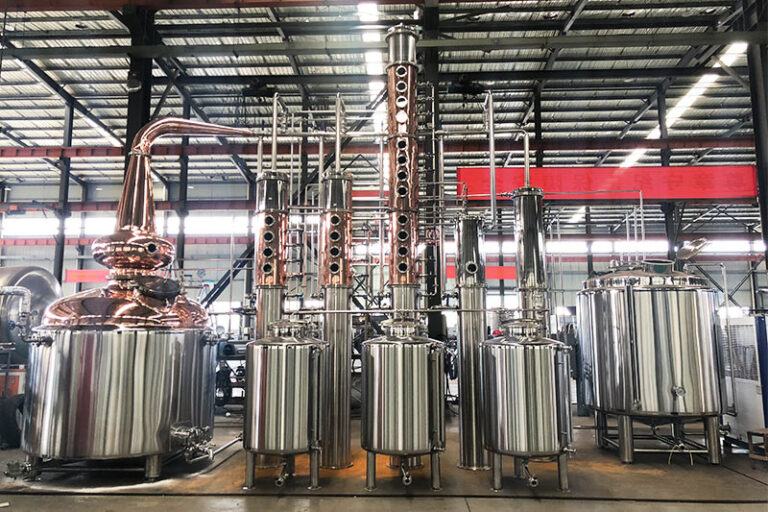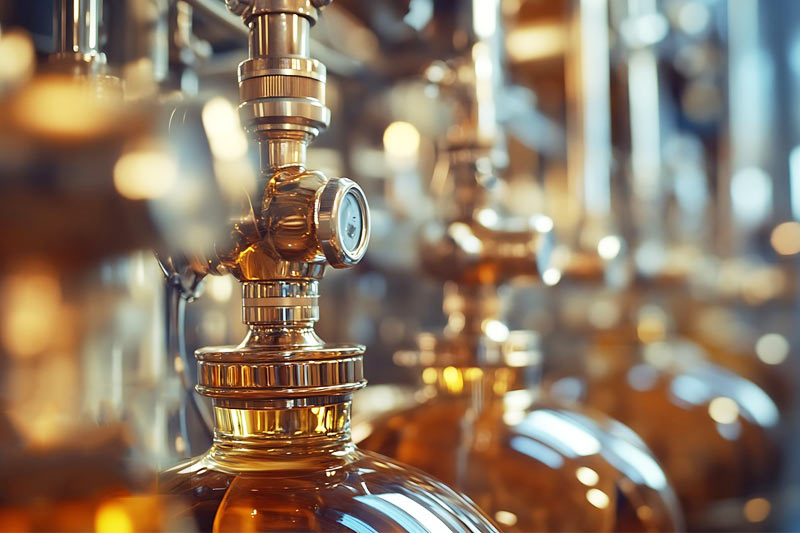Distillation is an important separation technology, which is widely used in the fields of chemistry, pharmaceuticals, food, and beverages. The basic principle of distillation is to use the difference in boiling points of the components in the mixture to evaporate certain components by heating, and then condense them into liquids by cooling, to achieve separation and purification. As the place where this process is implemented, the distillation plant has a wide variety of distillation equipment, each with its own characteristics. This article will explore in depth the distillation equipment commonly used in distillation plants, including its structure, function, application, and maintenance.
Table of Contents
Basic principles of distillation
Before we get to know the distillation equipment in depth, it is necessary to understand the basic principles of distillation. The distillation process is usually divided into the following steps:
- Heating: The mixed liquid is heated to a certain temperature in the heater, causing some components to evaporate into gas.
- Steam rises: The steam rises in a defined route (such as a distillation tower) and comes into contact with the liquid (such as a substance that no longer evaporates).
- Condensation: The steam cools down through the condenser and condenses into liquid.
- Collection: The liquid heading towards the condenser is collected, and this process can be repeated to achieve higher purity.
Through this principle, the distillation equipment can efficiently complete the separation and purification work in a relatively short time.

Types of distillation equipment
In distillation plants, distillation equipment is usually divided into the following categories according to different working principles and needs:
Distillation tower
The distillation tower is the core part of the distillation equipment and is usually used for large-scale production. Its main function is to separate the various components in the liquid mixture through physical processes. Distillation towers are generally divided into the following two types:
- Packing tower: The packed tower is filled with packing, which can be bulk or formed. The main purpose is to increase the contact area between the gas phase and the liquid phase and promote the transfer of substances. Packing towers are suitable for handling simple separation processes, such as the separation of multiple components.
- Tray tower: There are multiple trays inside the tray tower. The liquid flows between the trays to form a liquid film to contact the rising steam. The number and design of the trays affect the efficiency of distillation and are usually used for complex separation processes. This tower is widely used for the industrial separation of alcohol, petroleum, and chemicals.
Distiller
The distiller is usually used in small-scale production or laboratories, and its structure is relatively simple. The main working principle of the distiller is the same as that of the distillation tower, but it is smaller in size and suitable for rapid reactions and small-scale operations.
- Spherical distiller: Usually used in laboratories, allowing users to judge the progress of the reaction by observing changes in the color and smell of the sample.
- Rotary distiller: Suitable for the distillation of heat-sensitive substances, low-pressure heating can effectively reduce the thermal decomposition of the sample.
Condenser
The condenser is an indispensable part of the distillation equipment, mainly used for the cooling and condensation of steam. According to different structures, it can be divided into:
- Tube condenser: Usually longer, suitable for convection cooling, and can handle a large amount of steam.
- Plate condenser: Cooling with multiple layers of thin plates can effectively improve heat exchange efficiency and is more suitable for small-scale distillation.
Heater
The heater is used to heat the mixed liquid to the evaporation temperature. Depending on different needs, the type of heater is also different:
- Electric heater: Suitable for laboratories and small-scale production, capable of precise temperature control.
- Steam heater: Suitable for large-scale production, can quickly and evenly heat the liquid. Usually used more in industrial distillation processes.
Separator

Pumps and piping systems
During the distillation process, pumps are used to transfer liquids from one device to another to ensure the flow of materials. The piping system connects the various devices to ensure the smooth transportation of materials such as steam and liquid. Pipeline materials are usually corrosion-resistant and high-temperature resistant materials to prevent chemical reactions and degradation of materials.
Control system
In modern distilleries, advanced control systems are equipped to monitor the entire distillation process in real-time. The control system generally includes:
- Temperature sensor: real-time monitoring of the temperature of the liquid to ensure the smooth progress of the evaporation process.
- Pressure sensor: used to monitor the pressure in the distillation tower to ensure the safe operation of the equipment.
- Flow meter: ensure that the flow of liquid and steam in and out meets the expected requirements, thereby improving efficiency.
Workflow of distillation equipment
In the actual distillation process, various distillation equipment work together to complete efficient separation. The following is a typical workflow of the distillation process:
- Raw material preparation: First, prepare the raw materials required for distillation. The raw materials can be liquid mixtures or fermented liquids. During the preparation process, the raw materials usually need to be cleaned and filtered to remove impurities.
- Fermentation: For some raw materials that need to be fermented (such as making alcohol), yeast needs to be added to the fermentation tank for fermentation. The fermentation process generally needs to maintain a specific temperature and time to ensure maximum yield.
- Heating and evaporation: After fermentation is completed, the liquid is transferred to the heater and heated to the required temperature. During this process, specific components will evaporate into steam.
- Separation and condensation: The steam passes through the condenser and cools into liquid. At this time, the high concentration of alcohol and other volatile components in the liquid are effectively separated and collected.
- Collection and processing: The collected liquid is further processed as needed, such as blending, storage, or redistillation to improve purity. After further processing and inspection, it can be put on the market.
Maintenance and care of distillation equipment
- Regular inspection: Regularly check the operating status of various equipment, including parameters such as temperature, pressure, and flow, to ensure that they operate within a safe range.
- Cleaning and disinfection: Depending on the frequency of use and the different substances processed, the inside of the equipment needs to be cleaned and disinfected regularly to avoid the accumulation of impurities and cross-contamination.
- Replacement of worn parts: During use, some parts of the equipment may wear out due to high temperature or corrosion, and need to be replaced in time to ensure the normal operation of the equipment.
- Train operators: Operators need to undergo professional training and be familiar with the operating procedures and safety specifications of the equipment to reduce human errors and accidents.
- Record maintenance logs: After each maintenance, relevant data should be recorded for subsequent historical analysis and problem tracking.

How to choose the right distillation brewing equipment?
Choosing the right distillation brewing equipment is a key step to ensure that the distillation process is efficient, economical, and safe. Here are some of the main factors to consider when choosing equipment:
- Product type: Select equipment according to the properties and requirements of the product to be produced (such as alcohol, essential oils, chemical raw materials, etc.). Different products may have different requirements and process parameters for equipment.
- Production scale: Determine the production scale (small batch, batch, or continuous production) to select the appropriate type of equipment. For example, small-scale laboratory distillation equipment can be used for small-scale, while large-scale production requires the use of continuous distillation towers.
- Separation efficiency: Consider the separation efficiency of the equipment, especially when dealing with multi-component mixtures. The number of plates or the choice of packing in the distillation tower will directly affect the separation efficiency.
- Energy consumption cost: Consider the energy consumption and operating cost of the equipment, and choose equipment with high energy efficiency and low operating costs to reduce the overall production cost.
- Equipment material: According to the properties of the distillation medium (corrosiveness, toxicity, etc.), select suitable materials, such as stainless steel, glass, or other corrosion-resistant materials.
- Control system: Consider equipping with a suitable automatic control system to achieve real-time monitoring and adjustment of the distillation process and improve operational safety and stability.
- Maintenance and cleaning: The design of the distillation equipment should be easy to maintain and clean, ensuring the hygiene of the production process and the long service life of the equipment. If the equipment needs frequent cleaning or maintenance, it will be more important to choose a structure that is easy to operate.
- Supplier and technical support: Choose a reputable and experienced equipment supplier to ensure that they can provide after-sales service and technical support.

